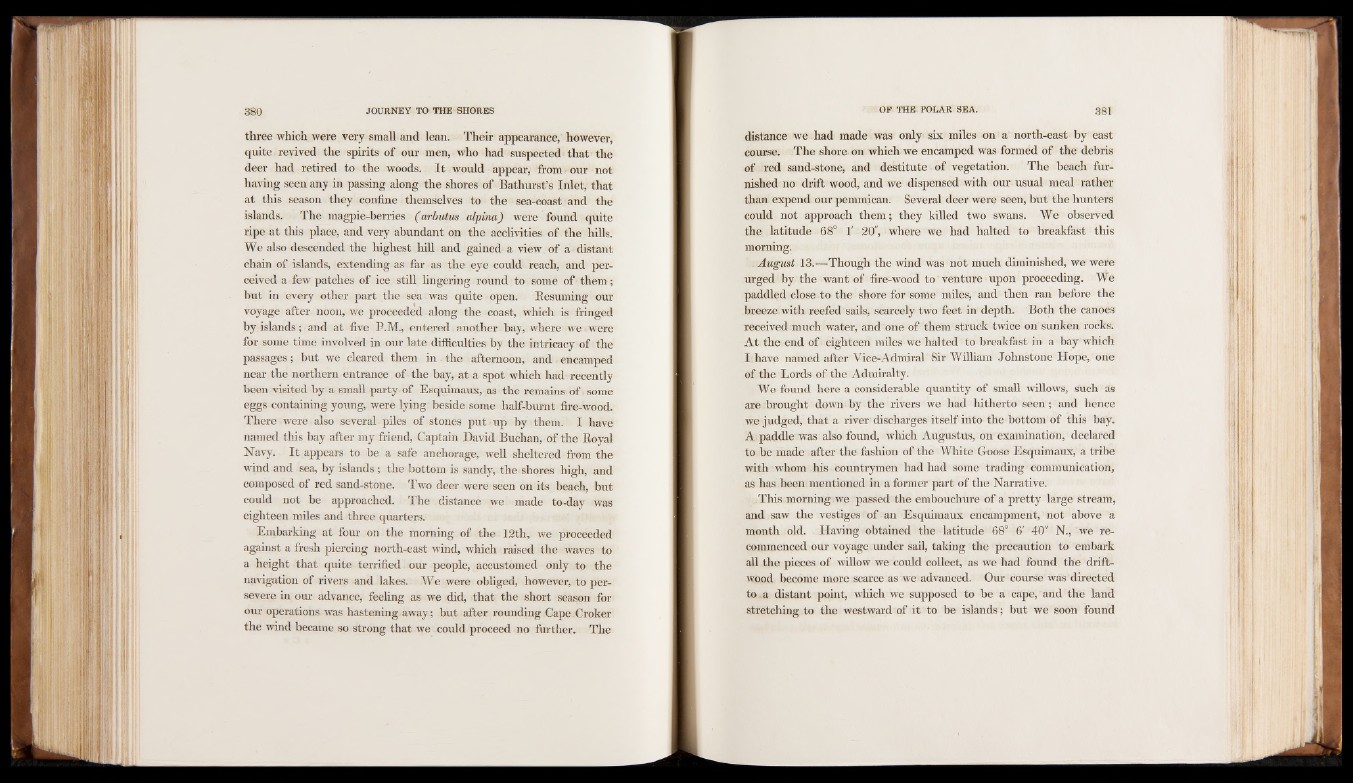
three which were very small and lean. Their appearance, however,
quite revived the spirits of our men, who had suspected that the
deer had retired to the woods. It would appear, from - our not
having seen any in passing along the shores of Bathurst’s Inlet, that
at this season they confine themselves to the sea-coast and the
islands. The magpie-berries ( arbutus alpina) were found quite
ripe at this place, and very abundant on the acclivities of the lulls.
We also descended the highest hill and gained a view of a distant
chain of islands, extending as far as the eye could reach, and perceived
a few patches of ice still lingering round to some of them ;
but in every other part the sea-was quite open. Resuming our
voyage after noon, we proceeded along the coast, which is fringed
by islands; and at five P.M., entered, another, bay, where wet were
for some time involved in our late difficulties by the intricacy of the
passages; but we cleared them in the afternoon, and | encamped
near the northern entrance of the bay, at a spot which had .recently
been visited by a small party, of Esquimaux, as the remains o f, some
eggs containing young, were lying: beside some half-burnt fire-wood.
There were also several piles of stones put up by them. I have
named this bay after my friend, Captain David Buchan, of the Royal
Navy. It appears to be a safe anchorage, well sheltered from the
wind and sea, by islands ; the bottom is sandy, the shores high, and
composed of red sand-stone. Two deer were seen on its beach, but
could not be approached. The distance we made to-day was
eighteen miles and three quarters.
Embarking at four on the morning of the 12th, we proceeded
against a fresh piercing north-east wind, which raised the waves to
a height that quite terrified our people, accustomed only to the
navigation of rivers and lakes. -We were obliged, however, to persevere
in our advance, feeling as we did, that the short season for
our operations was hastening away; but after rounding Cape . Croker
the wind became so strong that we could proceed no further. The
distance we had made was only six miles on a north-east by east
course. The shore- on which we encamped was formed of the debris
of red sand-stone, and destitute of vegetation. The beach furnished
no drift wood, and we dispensed with our usual meal rather
than expend our pemmican. Several deer were seen, but the hunters
could not approach them; they killed two swans. We observed
the latitude 68° 1' 20", where we had halted to breakfast this
morning.
. August 13.—Though the wind was not much diminished, we were
urged by the want of fire-wood to venture upon proceeding. We
paddled close to the shore for some miles, and then ran before the
breeze with reefed sails, scarcely two feet in depth. Both the canoes
received much water, and one of them struck twice on sunken rocks.
At the end ofi eighteen miles we halted to breakfast in a bay which
I have named after Vice-Admiral Sir William Johnstone Hope, one
of the Lords of the Admiralty.
We found here a considerable quantity of small willows, such as
are brought down by the rivers we had hitherto seen; and hence
we judged, that a river discharges itself into the bottom of this bay.
A paddle was also found, which Augustus, on examination, declared
to be made after the fashion of the White Goose Esquimaux, a tribe
with whom his countrymen had had some trading communication,
as has been: mentioned in a former part of the Narrative.
This morning we passed the embouchure of a pretty large stream,
and saw the vestiges of an Esquimaux encampment, not above a
month old. Having obtained the latitude 68° 6' 40" N., we recommenced
our voyage under sail, taking the precaution to embark
all the pieces of willow we could collect, as we had found the drift-
wood become more scarce as we advanced. Our course was directed
to,a distant point, which we supposed to be a cape, and the land
stretching to the westward of it to be islands; but we soon found